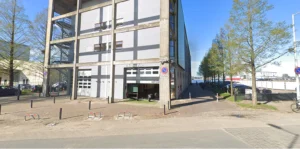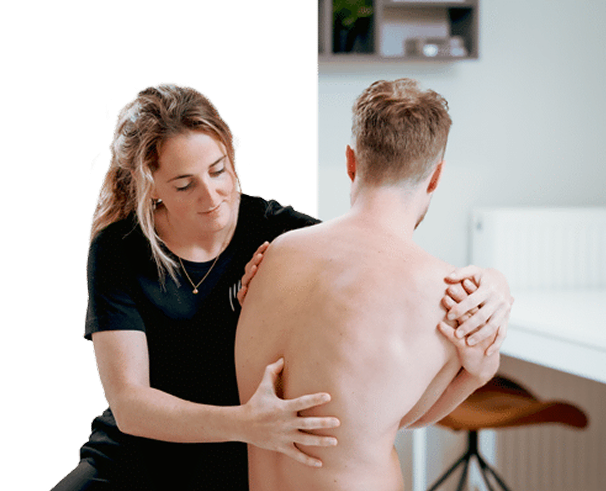Blogs
Frozen shoulder: What is a frozen shoulder and how to recover
Help, my shoulder is bothering me!
A frozen shoulder, also called an “adhesive capsulitis,” is a condition in which the shoulder becomes stiff and painful, resulting in reduced mobility. The pain can be mild, but often becomes more severe as the shoulder stiffens further, which can greatly affect daily life. Fortunately, there is help, and at The Physio Man, in addition to this free information and advice on what you can do at home, we also have effective physical therapy to relieve symptoms as quickly as possible and promote recovery.
What is a frozen shoulder?
A frozen shoulder results from inflammation of the joint capsule, the connective tissue that surrounds the shoulder joint. This inflammation leads to stiffness and pain, causing the shoulder to gradually “freeze” and become less mobile. This process can take months or even years. The condition often occurs with no apparent cause, but factors such as diabetes, thyroid disease, previous surgery, and prolonged immobilization can contribute to its onset(Oxford Academic).

The three stages of a frozen shoulder:
- Freezing phase: This phase usually lasts from several weeks to nine months. The pain increases and the shoulder becomes stiffer, making movement increasingly difficult.
- Frozen phase: For four to nine months, the pain subsides, but the stiffness remains. During this period, you can gradually exercise more without overexertion.
- Thawing phase: This is the recovery phase, which can last four to 12 months. The pain disappears and mobility slowly returns (springermedicine.com).
Symptoms and causes
The main symptoms are pain and stiffness in the shoulder that can radiate to the upper arm and even the neck in worse cases. These symptoms worsen in the early stages, especially at night, which can interfere with sleep. Movements such as dressing and undressing, driving a car, or grabbing something from a closet can cause a lot of pain. Although the exact cause is often unclear and can vary greatly, a frozen shoulder can occur after a fall, surgery, or injury where the shoulder remains immobile for an extended period of time. In addition, people with underlying conditions such as diabetes, thyroid problems, or Parkinson’s disease have an increased risk (Frontiers).
Treatment of a frozen shoulder
Although a frozen shoulder usually goes away on its own, the process can also take years. Physical therapy treatment is essential to speed recovery and relieve pain. At The Physio Man ourselves, we focus on an active approach to treatment tailored to the stage you are in.
Physical therapy for frozen shoulder consists of:
- Movement exercises: It is important to keep moving the shoulder within pain limits to prevent further stiffening. Your physical therapist will put together a customized program of exercises appropriate to your situation.
- Mobilization techniques: These techniques help to increase joint mobility and reduce tension in the surrounding muscles.
- Balance between rest and movement: Together with the physical therapist, you work on finding the right balance between exertion and relaxation to avoid overexertion.
- Homework program: To help your progress at home, you will be given targeted exercises that you can do independently.
- Fall prevention and strength training: As stiffness decreases, we focus on improving strength and balance to reduce the risk of falling
What can you do yourself?
- Keep moving: Try to keep moving your shoulder as much as possible within your pain threshold. Easy walking or light exercise will help stimulate blood flow and promote recovery.
- Relaxation exercises: In the early stages of a frozen shoulder, relaxation can help reduce tension and pain. Yoga or breathing exercises can support this.
- Be patient: Recovery from a frozen shoulder can take a long time, so be patient and consistent with your exercises. Stay in touch with your physical therapist to monitor progress.
The psychological impact of a frozen shoulder
A frozen shoulder can take a mental toll in addition to physical pain. Because of the long-term limitation in movement, people may experience feelings of frustration or even depression. This, in turn, can affect the recovery process, as stress is often associated with increased muscle tension and pain. At The Physio Man, we not only help with physical recovery, but also pay attention to the mental aspects of this condition. By incorporating relaxation exercises and breathing techniques, we support a holistic recovery, which not only relieves pain, but also promotes overall well-being.

Prevention after recovery
Even after the shoulder moves smoothly again, it is still important to take preventive measures. People who have had a frozen shoulder are at increased risk for future shoulder problems. The Physio Man offers exercises and tips to keep the shoulder healthy and strong even after full recovery. Consider maintaining flexibility, strength and maintaining good posture during daily activities to prevent new problems.
Role of nutrition and lifestyle in recovery
In addition to exercise, nutrition can play an important role in recovery. Nutrients such as calcium, vitamin D, and omega-3 fatty acids help repair tissues, such as the joint capsule that leads to frozen shoulder. This can help reduce inflammation and promote connective tissue repair (Frontiers). At The Physio Man, we also advise on healthy lifestyle habits that promote recovery and allow you to return to a pain-free, active lifestyle more quickly.
An active step toward supple shoulders
A frozen shoulder can greatly affect your daily life, but you don’t have to go it alone. At The Physio Man, we help you regain mobility and reduce your pain. Our experienced therapists offer personalized care with a treatment plan tailored to your situation. The Physio Man specialists are ready to help you with customized therapies and personalized advice. Our physical therapists will help you with exercises, posture corrections and treatments to reduce pain and make your shoulder flexible so you can move freely again.
Make an appointment today at The Physio Man and let our experienced therapists guide you to reduce your frozen shoulder and shoulder symptoms and improve your quality of life.
Why choose The Physio Man?
- Latest treatment techniques
- We look at the body as a whole
- 80% of our patients are complaint-free within a few treatments
- No long waiting lists
- Also open in the evening
At The Physio Man, we offer a wide range of treatment options aimed at reducing symptoms and improving quality of life. For questions or an intake consultation, contact us. Email info@defysioman.nl or call 020-3542926. Prefer to come by? Visit us at Jan van Galenstraat 301 in Amsterdam.


